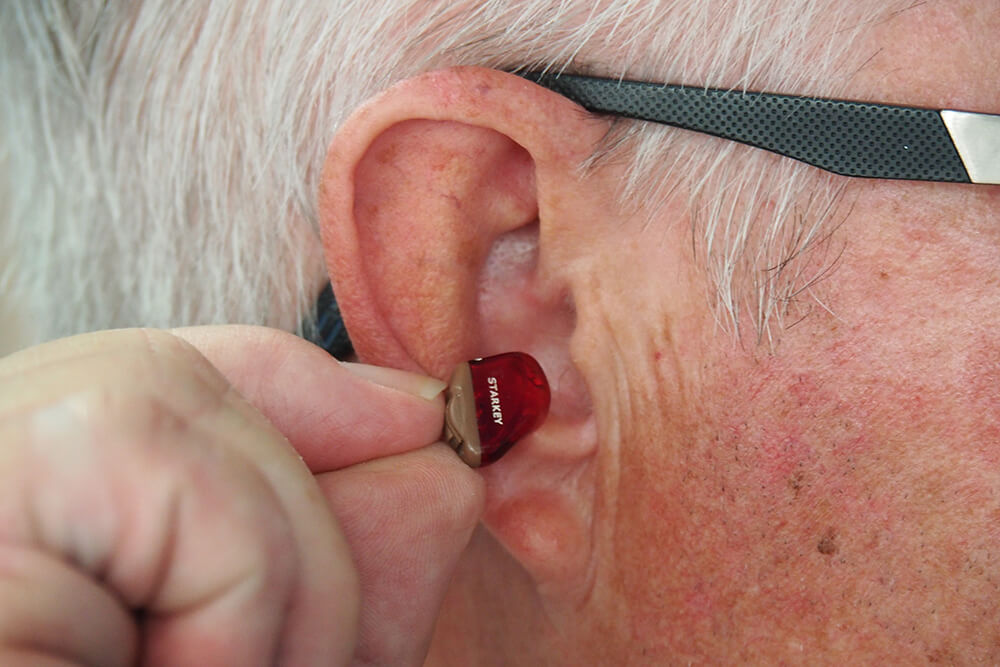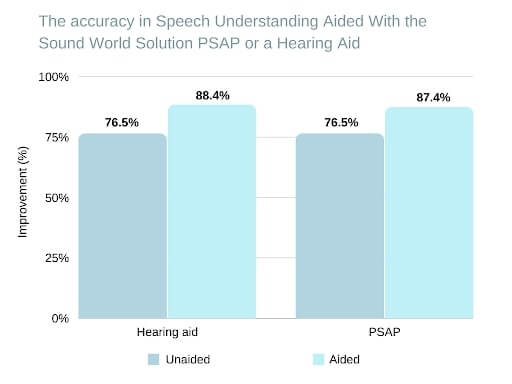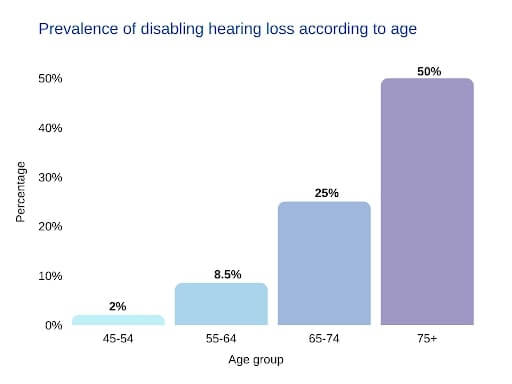Getting hearing aids often involves a series of tests, visits to an audiologist, and thousands of dollars out of pocket. Could over the counter hearing aids be the solution you’re looking for? Or are they better left behind the counter?
We’re taking a close look at over the counter hearing aids to see how they measure up against prescription devices and whether they’re worth a try.
Before you head out to get yourself a pair of OTC hearing aids, try out the best online hearing test to get a better idea of your level of hearing loss.
Key Takeaways
- Regulations for over the counter hearing aids have been proposed, but delayed for several years.
- OTC hearing aids are far cheaper than traditional hearing aids, and could potentially benefit the millions of Americans with untreated hearing loss.
- Research shows that OTC hearing aids are effective for mild to moderate hearing loss.
- You can purchase OTC hearing aids or digital amplifiers online from manufacturers or specific chain stores.
- It is best to stay updated with government websites on the availability of OTC hearing aids.
Can I Buy Hearing Aids Over the Counter?
Technically, you must have a prescription from a hearing care professional to buy a hearing aid. There are no US Food and Drug Administration (FDA) approved over-the-counter hearing aids as of mid-2018, despite already establishing regulations [1].
The 2017 FDA Reauthorization Act originally directed the organization to develop regulations by 2020 that would legally permit over the counter hearing aids. Unfortunately, this process has been delayed by the COVID-19 pandemic [2].
This delay is unfortunate, as the purpose of these new regulations is to provide greater access to consumers. Research estimates that 20.3%, or over 48 million Americans over the age of 12, have hearing impairments in at least one ear [3].
However, not everyone receives the right treatment due to a lack of affordable devices. The impact of untreated hearing loss includes poorer educational and professional achievement and impaired cognition later in life. This worsens with age, as one-quarter of people over 60 have a disabling degree of hearing loss [4].
What percentage of people aged 75+ do you think suffer with disabling hearing loss?

Do I Need an Over the Counter Hearing Aid?
Even if we can buy an OTC hearing aid, should we? Medical professionals advise you to still seek help from your primary care physician before buying any OTC hearing devices. Simply put, you need to find the real cause behind your hearing impairment. A hearing impairment may simply be caused by wax buildup in the ear, or be a symptom of a serious underlying condition [5].
You may benefit from an over the counter hearing aid if [6]:
- People say you speak too loud
- You often ask people to repeat themselves
- Hearing requires all of your concentration
- You need to turn up the TV or radio louder than what others feel is comfortable
- You can’t hear soft or high sounds, e.g. the top notes of musical instruments or dripping faucets.
Medical and audiological examinations can reveal severe hearing loss or other communication disorders that require more support from a hearing professional [5]. If you don’t benefit from an OTC hearing aid, consider specialist support.
Over the Counter Hearing Devices vs Hearing Aids
Amplification is the basis of how hearing aids work, the same as OTC devices.
The difference with OTC “hearing aids,” sometimes sold as amplifiers or Personal Sound Amplification Products (PSAPs), is their labeling and personalization. They cannot legally be sold to treat hearing loss and are not tuned to your individual needs. A prescription hearing aid will be tuned by your audiologist for the frequencies where your hearing is impaired [7].
Older OTC devices often indiscriminately amplified all sounds, so frequencies you hear normally (commonly lower pitches) would become too loud. This has improved in recent years, but they are not guaranteed to compensate for your impairment [7].
A study of 42 people tested several OTC devices against a traditional hearing aid for mild to moderate hearing loss [8].
The hearing aid increased their ability to understand speech from 76.5% to 88.4%. The three PSAPs used, improved accuracy by at least 80%, but one worsened it to 65.3%. However, these results may not apply to severe hearing loss [8]. Consider a hearing care professional’s support if you have little to no ability to hear normal speech.

FDA Hearing Aid Regulations
The FDA does not require hearing aid manufacturers to prove that their devices are safe and effective. They do not need premarket review unless they are surgically implanted, such as bone-anchored hearing aids [2].
However, as part of the Conditions for Sale regulation, it is recommended you have a medical examination within six months of the hearing aid being sold to you. You may sign a waiver statement instead of having an examination if you are an adult [1].
The FDA page, How to Get Hearing Aids, explains that they do not enforce a requirement for adults to have a medical examination before using hearing aids. They recommend you seek medical advice if your hearing loss is in only one ear; has suddenly appeared or fluctuates; occurs alongside dizziness or pain; or there is fluid, pus or blood coming from your ear [5].
What is enforced is the requirement for instructional brochures, including necessary labeling, to be available for you to read before purchase. Correct use, how to care for your device, and a disclaimer that hearing aids do not fully resolve hearing loss must be included [1].
As for PSAPs, they can be legally sold, but since 2013 it is illegal to market them using terms associated with hearing loss. They can be marketed for hunting or birdwatching purposes where someone with normal hearing would benefit from amplified sound [2].
When Will FDA Approve OTC Hearing Aids?
As of July 2021, there is no FDA-approved hearing aid you can buy without an authorized medical professional. This is four years after the 2017 proposal to allow over the counter sales. It is also despite statistics showing that only 14% of Americans with hearing loss use aids, with lack of insurance coverage being a key factor [9].
On July 9, 2021, an Executive Order by Joe Biden was released to increase competition across a range of industries, including that of hearing devices. The HHS was directed to consider publishing proposed rules for over the counter hearing devices within 120 days of this Order to end the delay [9].
Can I Get Hearing Aids Without a Prescription?
Buying hearing aids or similar devices with no prescription is possible. Until specific rules are set for over the counter hearing aid sales, you only have FDA-cleared or registered choices, as well as digital amplifiers or PSAPs.
Where Can I Buy a Non Prescription Hearing Aid?
One of the closest things you can get to the full hearing aid service from a licensed professional is MDHearingAid. This service offers several high-quality, FDA-registered devices chosen for you after a free online hearing test designed by ENT doctors and hearing aid specialists.
Although they are tuned by an in-house audiologist, MDHearingAid’s products are not customized. You can exchange your model for a different one if the first product doesn’t work for you. For more information, read our MDHearingAid review here.
Additionally, the FDA cleared Bose Corporation’s self-fitted hearing aid in October 2018, which had not yet become commercialized as of November 2020 [2]. The Bose SoundControl hearing aid was finally cleared for marketing in May 2021 [10].
You can purchase the SoundControl OTC hearing aid directly from the Bose website. This is currently limited to Massachusetts, Montana, North Carolina, South Carolina and Texas. If you live in a different state, you can register for updates.
How To Buy a Hearing Aid Online
You can buy a hearing aid online, or similar products such as a digital amplifier, from chain stores or directly from manufacturers. The best hearing aids are ones personalized for you, but you can easily find affordable, quality devices.
Purchasing both the MDHearingAid and Bose SoundControl hearing aid involves taking an online hearing test. The MDHearingAid test takes around eight minutes, and is designed by audiologists and other specialists.
Besides researching the quality of different devices, check your payment options too. MDHearingAid has 12-month payment plans available, and a 45-day risk-free trial if your first pair doesn’t work out. Their products can be paid with insurance if your plan covers hearing aids.
Resources for OTC Hearing Aids
Hearing loss can have serious implications for your quality of life now and your long-term health, so what are some reliable sources of information to stay updated? It’s best to avoid advice from businesses claiming to sell approved OTC hearing aids, as they may be prioritizing product sales over quality.
The FDA should be your first port of call for any information on whether or not a medicine or medical device is approved. Their Hearing Aids page is updated whenever necessary, with the last update being January 15th, 2021, at the time of writing (July 2021) [1].
FAQ
Is it possible to buy over the counter hearing devices at major chain stores?
Does Walmart Sell Over the Counter Hearing Aids?
Yes, Walmart does sell several types of OTC hearing devices. As of July 2021, a search of the website reveals a few Walmart hearing aids you can even purchase online.
For example, EarCentric EasyCharge claims to be an FDA-registered hearing aid with no “middleman”, provided directly to the consumer. It is marketed to “fit the majority of common hearing loss”, and claims you do not need a hearing test; however reviews of efficacy are mixed.
Also available are amplifiers that are typically indicated for enhancing normal hearing in situations such as birdwatching or hunting. These are in the same category of “Hearing Aids, Amplifiers & Accessories”, but look very similar.
Does CVS Sell Over the Counter Hearing Aids?
No, you can only purchase digital hearing amplifiers from CVS pharmacies online in the USA. The site requests no prescription on checkout, only your shipping details. Once again, reviews of their efficacy are mixed.
Conclusion
OTC hearing aids are on their way to being widely available, with at least two devices already legally sold directly to consumers. It is now possible for you to purchase hearing devices online and from some major retailers without prescription.
Although you must research different products to find a safe, quality aid, clinical research shows that OTC devices are effective, sometimes only slightly less so than prescription hearing aids.
If you are unhappy with the results of your chosen device; your hearing worsens; or if you experience other symptoms such as pain, dizziness or fluid leaking from your ear, seek medical advice.
References
- Center for Devices and Radiological Health. “Hearing Aids.” U.S. Food and Drug Administration, FDA, www.fda.gov/medical-devices/consumer-products/hearing-aids.
- Franck, KH.; and Rahi, VK. “Regulation of Over-the-Counter Hearing Aids – Deafening Silence from the FDA.” New England Journal of Medicine, 19 November 2020, www.nejm.org/doi/full/10.1056/NEJMp2027050.
- Frank R. Lin, MD. “Hearing Loss Prevalence in the United States.” Archives of Internal Medicine, JAMA Network, 14 Nov. 2011, jamanetwork.com/journals/jamainternalmedicine/fullarticle/1106004.
- “Deafness and Hearing Loss.” World Health Organization, World Health Organization, www.who.int/en/news-room/fact-sheets/detail/deafness-and-hearing-loss.
- Center for Devices and Radiological Health. “How to Get Hearing Aids.” U.S. Food and Drug Administration, FDA, www.fda.gov/medical-devices/hearing-aids/how-get-hearing-aids.
- Center for Devices and Radiological Health. “Hearing Loss.” U.S. Food and Drug Administration, FDA, www.fda.gov/medical-devices/hearing-aids/hearing-loss.
- Mamo, Sara K., et al. “Personal Sound Amplifiers for Adults with Hearing Loss.” The American Journal of Medicine, Elsevier, 21 Oct. 2015, www.sciencedirect.com/science/article/abs/pii/S0002934315009353.
- Nicholas S. Reed, AuD. “Personal Sound Amplification Products vs a Hearing Aid for Speech Understanding.” JAMA, JAMA Network, 4 July 2017, jamanetwork.com/journals/jama/fullarticle/2635618.
- “FACT SHEET: Executive Order on Promoting Competition in the American Economy.” The White House, The United States Government, 12 July 2021, www.whitehouse.gov/briefing-room/statements-releases/2021/07/09/fact-sheet-executive-order-on-promoting-competition-in-the-american-economy/.
- “510(k) Premarket Notification.” US Food and Drug Administration, 5 May 2021, www.accessdata.fda.gov/scripts/cdrh/cfdocs/cfpmn/pmn.cfm?ID=K211008.






Leave a Reply